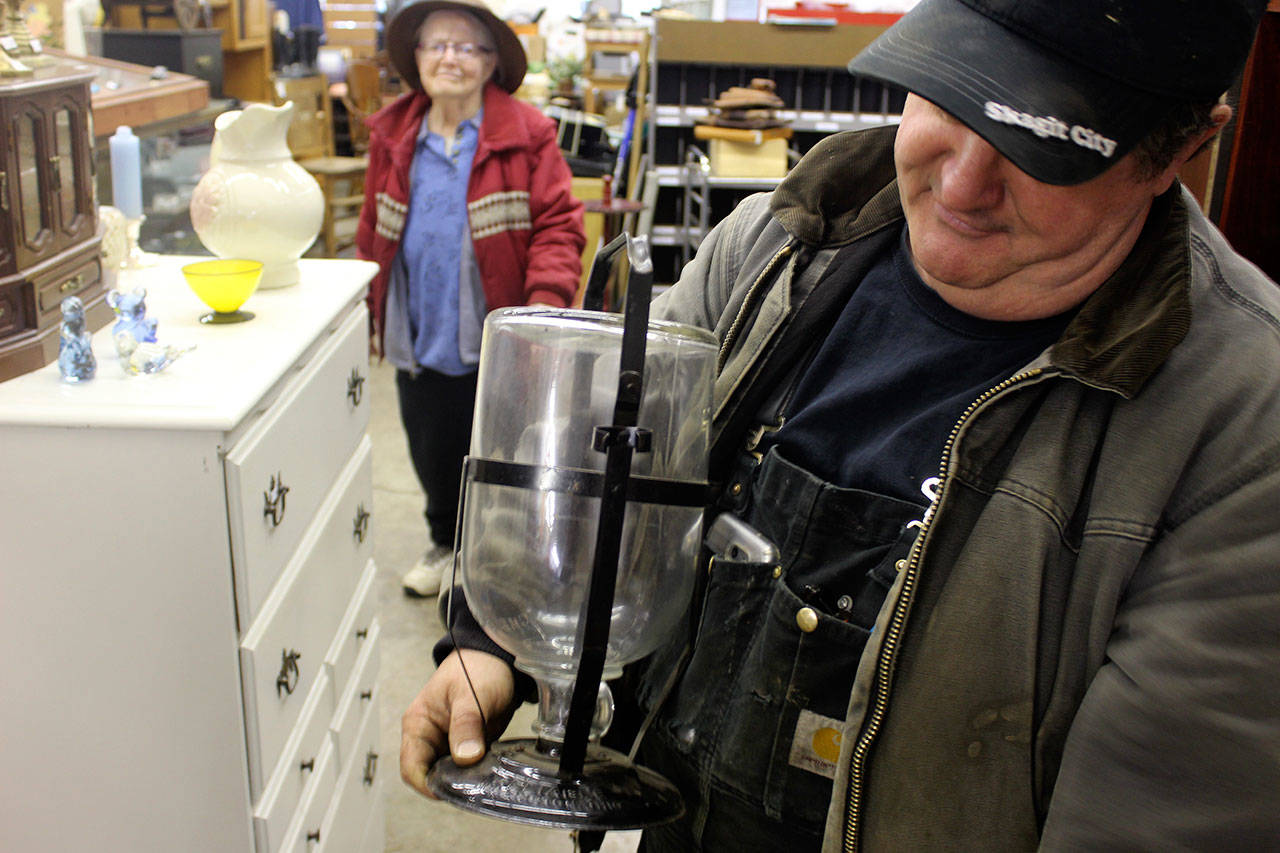Walk into Greenbank Trading Post and Upholstery and you’re bound to walk out with a treasure. Or at least your version of a great find.
Once filled with cows, the Bakken Road barn owned by the Gatto family is chock full of seemingly everything — tools, toys, tractor seats, tiny tea cups, household goods, handmade crafts, couches, cabinets and an occasional “whatsthisdo?contraption.”
Some customers wander aimlessly, others know exactly what they want.
At first, the requests may seem a little odd, said owner Anthony Gatto.
“Lately, I’m asked ‘Do I have extra saw blades?’” Gatto said. “It’s become popular to forge them into knife blades.”
House jacks are also in demand.
House jacks?
“It’s the tool needed to move houses. Guys come from Seattle looking for them,” he explained. “I’ve had a few over the years.”
Gatto and his mother, RuthAnn, may soon be ending their days in the buy/sell/trade business. He just started a new full-time job, RuthAnne is going on 85 and the market for antiques keeps dwindling.
“We’ve been doing this since 2000, finding collectibles, buying from estate sales,” said Anthony Gatto. “We’re not sure what we’ll do. Maybe (we”ll) have an auction and have sales.”
He also regularly gives away items to Whidbey’s many thrift stores.
A good 20 minutes is needed to get a good look through all the varied sections and selections arranged on shelves and tables.
In front, glasses, plates, pitchers, vases and dishes of a more refined time are arranged by color — blue, green, rose, red, gold.
For glass collectors, there’s also shelves full of old bottles. Kerosene lamps in prime condition and ready to light line one wall.
Holding up a tiny wooden rocking chair, Gatto demonstrated the ingenuity of the old days and the definition of a true antique — something that’s at least 100 years old.
“See it unfolds into a high chair. Just beautiful. Maybe worth $350 to $400.”
Gatto and his mother know to put aside certain items for some patrons’ personal proclivities.
“One of our regular likes elephants, anything with elephants on it. He probably has hundreds,” said Gatto. “Another lady, it was angels.
“And for Mom, it’s hummingbirds.”
With that remark, RuthAnne Gatto ‘fessed up.
“I have over 100 hummingbirds. I can’t help it,” she admitted.
Gatto got into the business of buying other people’s stuff because of his mother, he explained.
After years of driving her to church bazaars to sell her handmade crafts, he came up with a plan to have customers come to them.
The upstairs of the barn became his spot to reupholster furniture while the downstairs slowly filled with estate sale finds.
But his skills of meticiously making old tattered furniture look new isn’t in demand.
“You can buy furniture now cheaper than reupholstering it,” he said.
Additionally, no longer are many of the items in the Gattos’ collection selling like they once did, such as cobalt blue plates, Haviland china, Depression glass or three-leaf dining room tables.
One reason is baby boomers don’t need anymore stuff; they’re the ones unloading it.
And their kids and grandkids have different tastes — and the two “I’s” — Ikea and the Internet.
“If I had old dentists’ chairs, they’d go nuts over it,” Gatto said. “If it looks futuristic, the young kids want weird bizarre shapes.”
The market for traditional English and American furniture, overall, has fallen maybe 50 to 75 percent, estimated David Lackey, an appraiser on the long-running PBS series “Antiques Roadshow.”
Interviewed on a recent Marketplace radio segment, Lackey said the millennial generation (generally defined as born in the early 1980s to 1990s) may not have inherited a love of antiques.
“The younger generation, for the most part, is not very interested in formal candlelight suppers,” Lackey said. “They don’t want silver, china, crystal, because they don’t intend to entertain that way.”
Millennials have surpassed baby boomers as America’s largest living generation — 80 million strong — so that makes those in the 20-36 age range a driving force behind shopping trends.
When he started in the business, Gatto decided to make a tourist brochure to spotlight all the antique and collectible stores along Whidbey’s main highway.
“In 2000, we had 13 listed from Clinton to Oak Harbor,” he said folding out the now extinct map and brochure. “Less than half have come and gone. It’s very hard to make it.”


